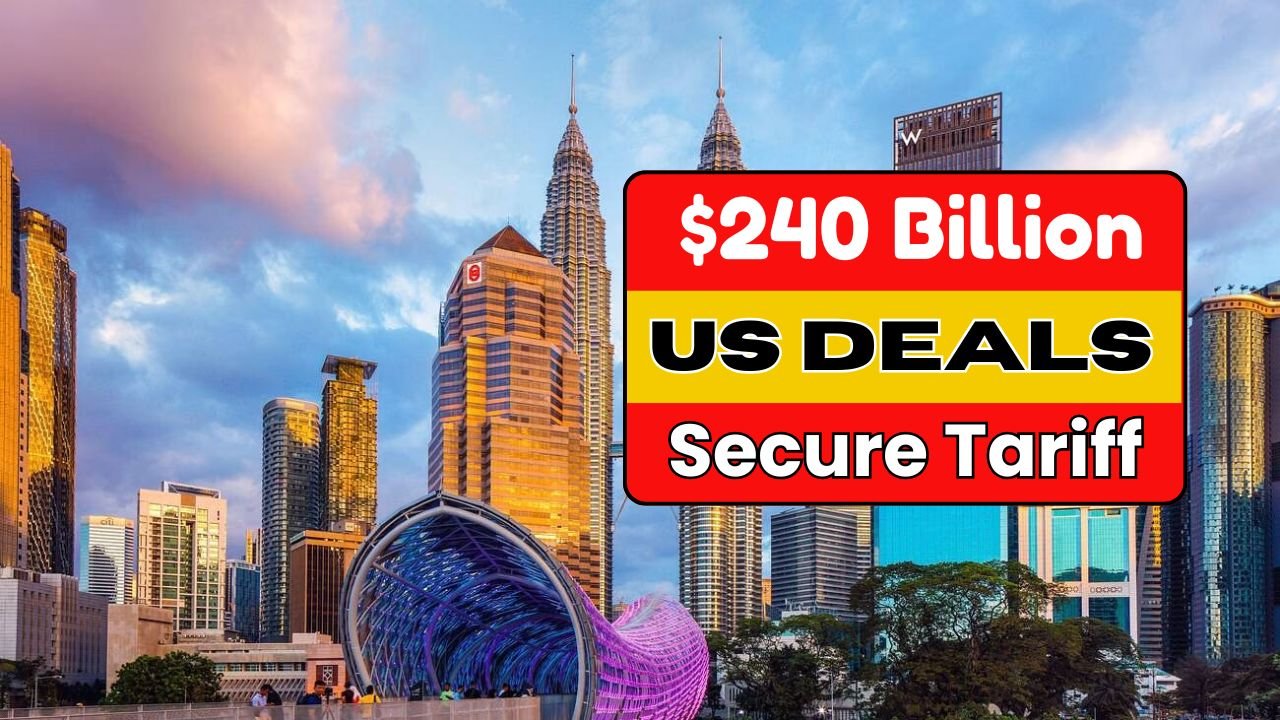In a major move to strengthen international trade ties and cushion the impact of shifting global economic dynamics, Malaysia has pledged more than US$240 billion in commercial deals with the United States. The announcement comes at a critical time as global trade patterns continue to evolve amidst geopolitical tensions and ongoing supply chain disruptions.
This strategic partnership signals Malaysia’s intent to not only deepen economic collaboration with one of the world’s largest economies but also to mitigate potential fallout from international tariff disputes, especially as global powers recalibrate trade relationships.
A Strategic Pivot to Stability
Malaysia’s decision to engage in large-scale investment and trade agreements with the United States is a calculated pivot toward economic stability. With ongoing concerns around tariff barriers, trade restrictions, and regional uncertainty, the Malaysian government has prioritized long-term economic resilience.
The commitment includes collaborations across a range of industries, including technology, semiconductors, clean energy, agriculture, and infrastructure development. The deals are expected to open new pathways for Malaysian exports and bring in foreign direct investment that will benefit local industries and job creation.
Tariff Relief and Trade Continuity
One of the primary motivations behind these deals is the potential easing of trade tariffs imposed by the U.S. on certain imports. Malaysia, which is heavily reliant on exports, particularly in electronics and palm oil, has been looking for ways to secure stable access to key global markets.
By entering into high-value trade and investment agreements, Malaysia is aiming to position itself as a trusted economic partner. In turn, this could lead to preferential tariff treatment or exemptions for key Malaysian goods, providing relief to exporters and ensuring smoother trade flows.
Key Sectors Benefiting from the Deal
Several key sectors are expected to benefit directly from this US$240 billion commitment:
Technology and Semiconductors
Malaysia has long been a hub for semiconductor manufacturing and electronic components. Through the new partnerships, U.S. firms are expected to collaborate with Malaysian counterparts on research, development, and manufacturing, especially as the U.S. seeks to diversify its supply chain outside of China.
Green Energy and Sustainability
Another major focus of the investment is the green energy sector. Malaysia’s commitment to achieving net-zero emissions by 2050 has opened the door for foreign partnerships in solar power, hydrogen fuel, and sustainable infrastructure. The U.S. deals include provisions for joint renewable energy projects that will modernize Malaysia’s energy grid and reduce reliance on fossil fuels.
Agriculture and Food Security
With rising food prices and climate-driven agricultural challenges, Malaysia is working with U.S. firms to improve food security through sustainable farming practices, biotechnology, and digital agriculture. These collaborations aim to ensure a more robust domestic food supply while also exploring new markets for Malaysian agro-products.
Infrastructure and Urban Development
Part of the investment will go toward modernizing Malaysia’s transportation and urban infrastructure. U.S. companies will be involved in building smart cities, upgrading ports, and enhancing digital connectivity, making Malaysia more competitive as a trade and logistics hub in Southeast Asia.
Diplomatic and Economic Implications
Beyond the economic boost, this trade engagement carries important diplomatic weight. Malaysia is signaling its willingness to work with both Western and Eastern powers without choosing sides, a move that aligns with its traditionally non-aligned foreign policy stance.
By deepening ties with the United States, Malaysia hopes to maintain balanced relationships with major economies while avoiding being caught in the crossfire of geopolitical rivalries, particularly between the U.S. and China.
Domestic Response and Challenges Ahead
Domestically, the announcement has been met with cautious optimism. Industry leaders have welcomed the investment, especially in sectors that have been struggling post-pandemic. However, critics have called for transparency in the implementation of these deals, ensuring that local businesses and workers are prioritized.
There are also concerns about over-dependence on foreign investments, which may leave the country vulnerable to external economic shocks. Policymakers are expected to introduce safeguards and ensure that these agreements are aligned with national interests and long-term development goals.
What It Means for the Malaysian Economy
The US$240 billion deal is a major confidence boost for Malaysia’s economy at a time of global uncertainty. With GDP growth projected to slow down in the next few years due to external pressures, this trade engagement offers a lifeline.
It is expected to create thousands of new jobs, boost export figures, and enhance Malaysia’s reputation as a competitive global trade partner. Additionally, the potential for tariff reductions could significantly benefit small and medium-sized enterprises (SMEs), which form the backbone of the Malaysian economy.
Looking Ahead
Malaysia’s decision to commit to these large-scale U.S. deals marks a proactive step in securing its economic future. With trade partnerships evolving in the face of global shifts, Malaysia has shown that it is willing to adapt, collaborate, and invest in its people and industries.
The months ahead will be crucial as these agreements transition from pledges to action. Implementation, transparency, and inclusive growth will determine whether this US$240 billion commitment delivers long-lasting benefits for the nation and its citizens.

